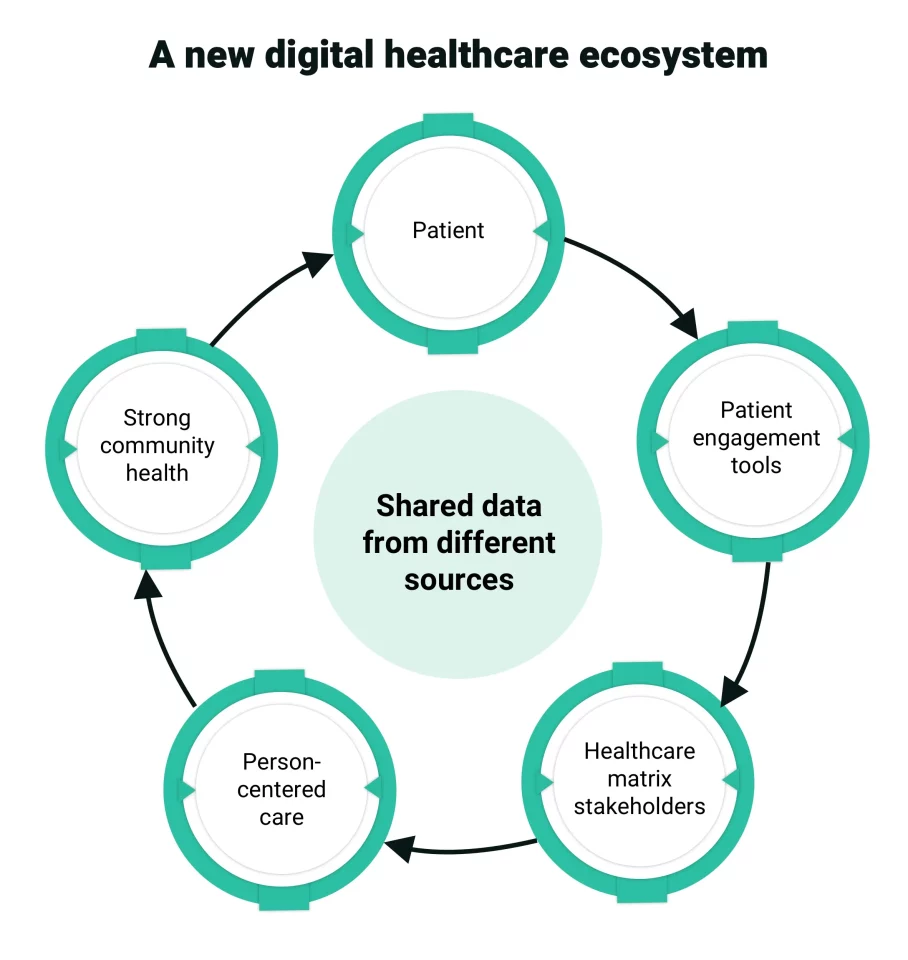INTRODUCTION
Patient engagement leads to stronger community health
In the near future, an integrated health ecosystem will deliver person-centered care through advanced medical facilities, smart homes, connected devices, and a distributed medical Internet of Things.
The data thrown up by an increasingly digitized world has spawned a new digital health ecosystem that promotes patient engagement, patient-provider experience, and personalized medical care.
Even consumer-generated data that could well be a by-product of digital interactions that a person has with wearables, social media, and mobile apps can translate to clinical data that reveal specifics about an individual’s health and public health in general.
In addition, there is data from patient engagement tools such as automated appointment reminders, medication trackers, e-prescriptions, and tele-consultations. This data is humungous and valuable. When it is seamlessly linked to different healthcare systems -with due consideration to security and privacy issues -patients, providers, and payers get to share personal health information (PHI) for the better of all three groups:
Patients: In the information age, health-conscious and tech-savvy patients are not averse to sharing information as long as it is done securely. It not only lets them participate in their own healthcare but also empowers them to choose their treatment pathways.
Providers: A large chunk of time is taken up by activities like gathering medical history, clinical data collection, and preliminary evaluation. If the required data comes directly from the patient, it would ease the operational burden.
Payers: Insurance companies and governments can design better healthcare coverage and policies if they have access to real-time or most current data. Personalized insurance policies with flexible premium rates are also a possibility.
Thus, digital patient engagement tools facilitate data share. When data is shared, costs drop, patient outcomes improve, and the entire community health system runs much smoother than before.
By providing patients greater access to digital services and empowering more robust data sharing between key healthcare matrix stakeholders, health ecosystems extend human longevity and potential.
Digital health applications streamline medical operations to strengthen community health networks. Patient engagement is a critical component of delivering vital preventative and wellness healthcare interventions that strengthen the entire digital health ecosystem. In this article, learn more about how to leverage digital patient engagement tools for the greater good.
TOOLS
Patient engagement tools for preventative healthcare
A rural physician set out to learn why one of his aging patients kept going into and out of the hospital with recurrent congestive heart failure exacerbations. He examined the patient’s medical record to find the cause of the patient’s frequent hospital re-admissions. The answer soon became crystal clear—lack of continuity of care following discharge and limited patient engagement with aftercare recommendations.
The regional health system had been unable to effectively transition the patient through their care infrastructure, empowering her to manage her condition without the need for medical intervention. The physician knew there had to be a better way to engage his patients to prevent health mishaps.
That brings us to the concept of providers as partners in the healthcare journey of a patient. A physician’s role is no longer limited to the point of care!
Today, at the cutting edge of medical possibility, new patient engagement and monitoring tools are transforming care delivery models across all medical specialties:
Follow-ups: Be it after consultation or hospitalization, automated follow-up emails, text notifications, phone calls, or video conferences are a must.
Custom-made apps: Healthcare providers have expert healthcare software development companies design and develop tailor-made apps to promote patient engagement: appointment reminders, instructions on admission, feedback collection, and so on.
Patient portals: A 24/7 online platform that provides the patient easy access to electronic health records, lab reports, medication regimens, medical history, and recent visits to doctors. Patient portals offer two-way communication for patients and caregivers.
Surveys, feedback forms, newsletters, and emails are other important patient engagement tools.
Patient engagement tools reinforce the digital healthcare ecosystem
BENEFITS
Benefits of digital patient engagement tools for provider/payer networks
Given below are the advantages of patient engagement tools for hospitals and insurance companies:
- Enhanced patient satisfaction, experience, and retention.
- Successful medical outcomes through healthcare software compliance.
- Improved operational efficiency with reduced administrative tasks.
- Capability to meet meaningful use criteria to achieve care goals.
- Focus on preventative measures to reduce re-admissions.
- Pressure eased on human resources and costs.
- Increased productivity through digital transformation.
- A robust digital health ecosystem with effective insurance schemes.
CONSUMERS
Advantages of patient engagement tools for patient-consumers
Here is a list of benefits that patients enjoy when they use patient engagement tools:
- Access to a single unified platform that delivers all the healthcare information needed to manage own care in one place.
- Faster access to physicians, information, prescriptions, and emergency medical interventions.
- Adherence to medication and care plans due to automated reminders leads to better health.
- Ability to use telehealth technologies to deliver phone and video-based appointments in place of in-person visits.
- Reduction in the time it takes to schedule appointments, see physicians, or fill prescriptions.
CUSTOMIZATION
Developing custom patient engagement tools
Patient engagement tools offer the opportunity to improve hospital operations vastly.
The custom software development process for developing digital patient engagement tools is an opportunity to laser focus on key operational processes, implement smart automation, and improve operational decision-making to increase revenues.
The software development process also offers an opportunity to look deep into the analytics around patient interactions and develop innovative new workflows to save time and money while delivering patients better medical outcomes.
Developing a digital patient engagement tool enables your organization to gain deeper visibility into the analytics driving your success and improving the profitability of your operations.
By improving compliance, simplifying data collection, streamlining the delivery of medical services, and moving towards establishing a patient centric healthcare app market, there really is a way for all stakeholders to benefit.
Client-facing web portals, consumer product integrations with wearable technologies and mobile applications empower healthcare providers to connect with patient-consumers, securely share PHI, and improve the efficiency of care in a way that offers measurable benefits for patients and providers.
Building complete end-to-end patient engagement ecosystems boosts hospital reputations by creating a stronger connection between patients and their providers.
As consumers become more attuned to the digital landscape, it surely makes complete sense to develop patient-facing applications that deliver the usability, functionality, and experience they are used to when using other popular social media platforms and e-commerce apps.






